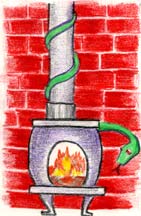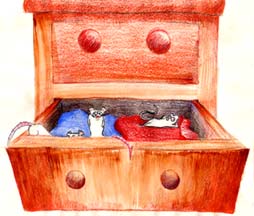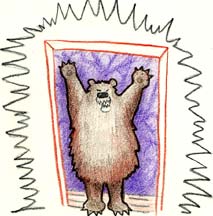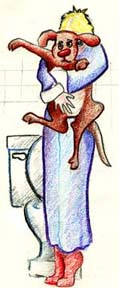Editor’s note: Traditions return with the holidays, knitting our pasts and present into a garment we wear into the future. At Bay Weekly we’ve made it a holiday tradition to tell you a story of the season’s milestones in our extended family.
“Come down to the farm,” Jess said. “We’ll have a real country Christmas.”
A country Christmas. What does that mean?
I’ve lived my entire life in the suburbs, so I thought of The Waltons’ Christmas special I watched when I was a kid. That schmaltzy show was all I knew about a country Christmas. Snow falling, the family gathering on the mountain, everyone so agreeable and stoic. Of course, there was that Great Depression thing going on. I swept that image aside, refused to allow the banjos from Deliverance to twang in my head and cued the Christmas carols.
Dashing through the snow, in a one-horse open sleigh, o’er the field we go, laughing all the way …
Over the river and through the woods to grandmother’s house we go, the horse knows the way to carry the sleigh through the white and drifted snow …
Chestnuts roasting on an open fire …
“Sure,” I said without consulting my husband. “We can’t pass up Christmas in the country.”
 Over the Mountain
Over the Mountain
Earlier that year, my cousin, Jessica Nagle, and her husband, Reid, had left New York City and moved to a 100-acre farm in White Hall, Virginia, which is about 25 miles northwest of Charlottesville.
They wanted to share their first Christmas on the farm with family. Jess’s mom, my aunt Dorothy Waxman, flew in from Manhattan. Aunts Regina and Jeannette Baczewski drove down from Long Island. My husband Phil and I locked the door to our townhouse in Arnold and headed for the country.
“If you’re feeling adventurous,” Jess wrote in her directions, “come over the mountain — but only if the weather is good and you have the truck.”
Over the mountain was a narrow, pitted dirt road with a sharp rise to the right, a death-inviting drop to the left and no guardrail. A few homes clung to the side of the mountain, and cattle and goats grazed nearby.
“This sure is remote,” I said to Phil and searched the radio for Christmas carols.
Descending the mountain, we spied a paved road: civilization. When we pulled up to the house, everyone rushed out to greet us. We’d come over the mountain; it felt like we’d climbed the Himalayas.
 Oh, Christmas Tree
Oh, Christmas Tree
The old farm house had sloped, creaking wooden floors and was heated by a wood-burning stove. Across the back lawn, at the bottom of the hill was a pond with a beaver dam, and in the distance rose the snow-capped Blue Ridge Mountains. Greens were strung about the windows, and presents were piled in a corner. The only thing missing was a Christmas tree.
“I thought we’d cut down our own,” Jess said.
The aunts, who remembered Christmases on Long Island when it was mostly potato farms, urged us on with stories of the trees they had chopped down in the woods of their youth.
So Jess, Phil and I piled into Jess’s truck to drive the farm in search of a tree. Reid was still at work in Charlottesville. Wasn’t that convenient?
Most of the farm was open pasture for cattle, and we soon realized that it held no small trees. We finally homed in on a stand of loblolly pines. The trees were bare save for their crowns, which swayed in the breeze at least 80 feet above our heads.
“This one.”
“No, this one.”
“I found it.”
We called to each other as we stumbled through the underbrush, our eyes fixed skyward, searching for the perfect Christmas tree.
But we did select a tree, and Jess retrieved two bow saws from her truck. I looked at the trunk of the tree and at those two little saws. This is going to take a while, I thought.
Behind us ran the creek. We needed the tree to fall forward, into the grassy field.
“What do you think?” Jess asked.
“I don’t know. Maybe notch it over here,” Phil said and pointed to the trunk.
“You were in the Navy,” Jess said. “I thought you would know what you were doing.”
“It’s not like I sailed on wooden ships with John Paul Jones,” Phil said.
Each of us had gone through a few career changes, and now we were a lawyer (me), a banker (Jess) and a photographer (Phil), searching through too many years of schooling for some practical knowledge. We couldn’t find any.
“We should weaken it on the side we want it to fall,” Phil reasoned and started sawing on the side of the trunk facing the grassy field. Then we took turns sawing. And we sawed and sawed, discarding jackets from the effort. And we sawed some more, jamming fingers between the bow and the tree, drawing blood and a few words not in keeping with the season. And we sawed a little more and then a little more.
Eventually, the tree creaked, and then it leaned.
Phil made a few final cuts while Jess, and I pushed against the trunk. It snapped. The needles on the highest branches seemed to grasp at the air, slowing its fall and bending the trunk in a graceful arc.
When the tree thumped to a halt against the earth, we yelled and cheered and hugged each other. We’d done it, just like Paul Bunyon.
After the celebration, we walked up the long, knotted trunk to the crown. It was sparse, holding only five or six branches from which we could hang ornaments. We laughed and laughed — until we realized that we’d cut down an 80-foot tree for a room with a 10-foot ceiling. That’s when we started sawing again.
 It’s Only a Mouse
It’s Only a Mouse
Christmas morning arrived cold and clear. Reid was up early stoking the fire in the wood-burning stove. We started the day with coffee and moved to the presents, with everyone wearing the cheery red sweatshirts handed out by Aunts Regina and Jeannette. Reid’s new goats slept in their pens while Jess’s new pot-bellied pig snorted and grunted. The sun shined off the pond, and I tried to ignore the white swan feathers strewn about the shoreline. I figured that even the fox deserved a Christmas feast.
After a jog along the country lanes, Reid disappeared for a shower. Later, shortly before breakfast, he complained that a mouse was nesting in his sweaters.
Aunt Jeannette leaned across the table toward me. “Nancy,” she whispered, “it’s not a mouse.”
“Oh, no?” I said.
“It’s an R-A-T,” she said, spelling the word for effect. Then she set her mouth in a thin, grim line and gave me an all-knowing nod of her head.
“It’s only a mouse,” I said, but my voice sounded like I was eight years old again.
When I was young, Aunt Jeannette always took my brothers, Jess and me for adventures in the woods near our grandmother’s house. She’d lead us along the narrow, overgrown paths, then, with a worried look on her face, she’d ask, “Did you hear that?” A few minutes later she’d be howling like a wolf. She was the one who convinced my brother to paddle out onto a pond in a small raft, only to have him sink up to his knees in the muck. And it was she who would go outside at night to scratch at your window. We all loved it, screaming in fear and delight.
Christmas Day passed slowly. We hunted fresh eggs in the hen house, fussed over the goats and pigs, explored more of the farm and cooked and ate and cooked and ate. All the while thoughts of the R-A-T danced in my head.
The house had been vacant before Jess and Reid moved in. They said there was a snake in the attic. And we’ve all had mice come into our houses when the cold weather arrives. Why not an R-A-T?
It didn’t bother me until the middle of the night when I woke to use the bathroom. All the lights were out, and not a creature was stirring, as the story goes. But had the R-A-T read that one?
I lay there listening for a scurrying rodent, unable to lower my bare feet to the floor. Why hadn’t I thought to wear socks to bed? Where were my boots? No, forget that idea, a boot might be an excellent place for an R-A-T to hide.
Too embarrassed to wake Phil, I called to our two dogs sleeping at the foot of the bed. Surely they would protect me. But after a day of romping in the country, they were exhausted.
I pulled one toward me, all 18 pounds of him, and cradled him in my arms. After clearing my throat several times to announce that I was awake and that anything that didn’t belong in the house should run and hide, I put my feet on the cold wooden floor.
With the dog sleeping in my arms, I stumbled to the bathroom and cleared my throat again.
But now what should I do?
I envisioned something with buck teeth and whiskers nuzzling my toes while I, well, you know.
I put the dog on the floor and buried my feet in his thick black coat.
 A Bear in the House
A Bear in the House
Jess and Reid eventually banished the snake and the mice and the R-A-T when they renovated the old farm house. That holiday season they were living in a rented house across the pasture and up the hill.
Several homes were clustered together, and each had a few big dogs that were always congregating at Jess and Reid’s door. To this pack, Jess and Reid contributed their Bernese mountain dog, Layla. The dogs were playful and gentle, but underneath, you could tell they were the wild bunch roaming the countryside, albeit without the leather jackets.
My suspicions were confirmed when I discovered Layla hanging out with her buddies while carrying what looked like a bear paw in her mouth. Could it really be a bear paw? I took a closer look. Yup, there were the long claws, the shaggy black coat, the full, wide pads of the foot.
“I’m gonna be sick,” I said.
“It’s the country,” Phil said.
That night, Phil and I slept on a sofa bed a few feet from the front door. Layla spent the night on the porch just on the other side of the front door barking to her pack buddies. Jess spent the night in the master bedroom yelling at Layla to be quiet. Our dogs spent the night in bed with me and Phil, barking at Layla.
When Layla eventually quieted down, we all fell asleep.
Hours later, the front door flew open to bang against the wall. Cold air swept over Phil and me, and, in the darkness, we could only make out the shape of a large, furry animal lumbering toward the bed.
Phil jumped up, ready to fight the hairy beast. Barking and snarling, our little dogs came to his aide.
And there was Layla, big, shaggy Layla, tired of sleeping outside.
“I thought it was a bear,” Phil said.
“I thought it was supposed to be peaceful in the country,” I said.
 A Country Christmas
A Country Christmas
The years pass and still we gather at Jess and Reid’s farm. A few things have changed. Aunts Regina and Jeannette now travel up from Florida. Phil and I bring our horses to the farm and ride Christmas morning. And most importantly, the family has gotten bigger with Jess and Reid’s two children, Mackenzie and Sophie Pepper.
It’s Christmas Eve and the stars shine down from a sky empty of street lights, the horses stand at the fence waiting for their late-night snack, Aunt Dorothy returns from feeding the goats and the pig, and Reid tells the children of how the Grinch stole Christmas.
Then Aunt Regina asks everyone to think of their earliest Christmas memory.
For me, it’s hanging stockings with my brothers. Phil recalls his father crashing his gas-powered airplane on its maiden flight. Aunt Jeannette speaks of the doll her mother sewed for her. And around the room the stories travel.
It’s a real country Christmas.